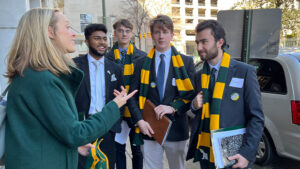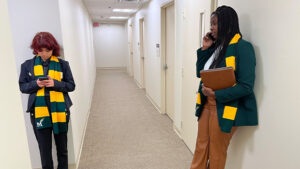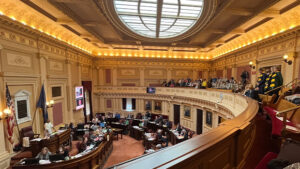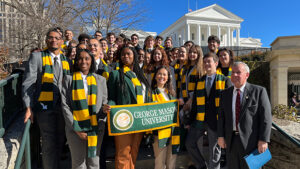Students Return to In-Person Lobbying in 2023
By: Orlando Cabrera, Mason Votes Online Editorial Team
RICHMOND, VA—On a brisk January morning, two days after the start of the Spring semester, a bus pulls off East Broad Street onto Eleventh Street. The day begins in the East Reading Room of the Library of Virginia. Virginia Secretary of Education, Aimee Guidera, Senator Jeremy McPike, and Democratic Caucus Chair Charniele Herring served as the welcoming party for Mason students of varying backgrounds. This warm welcome by university representatives marked the tenth annual Mason Lobbies effort and the first in-person lobbying effort under President Washington’s administration.
Part-time legislature is an unpredictable game in the world of politics and Virginia’s system more so. With a biennial budget process on even years, the time dedicated to legislating is even more limited on the off years, reducing the effective governing time to 60 days every year. These constraints not only limit governing, but an important aspect of civic participation—advocacy.
Nonetheless, George Mason University administrators, government relations staff, and Student Government representatives gathered for the first time since the beginning of the pandemic. Contending with limited time, an enthusiastic group of student activists and advocates were prepared to push Mason’s policy priorities across Capitol Hill. From the first moment stepping off the bus, Mason leadership was working to get to scheduled meetings in a timely manner, but also set walk-in meetings with legislators from across the commonwealth and the political spectrum.

Government Relations Associate Director Lauren Posey speaks with students as meetings wrap up for the morning. Photo by: Orlando Cabrera
“A lot of college-aged people today are very aware of voting and the importance of voting, so I think that’s square one of civic participation—is current events in government. But I think that events like Mason Lobbies take civic participation, especially for young people a little bit further,” reflected Student Government Chief of Staff Lauren Battey. The question on January 26th was what that step further would look like after a pandemic with new student leadership who had never experienced in-person advocacy in Richmond on the scale of Mason Lobbies.
Throughout the morning, Mason students and administrators traversed Capitol Hill, navigating the halls of the General Assembly’s temporary office space in the Pocahontas Building on the south end of the Capitol complex. Students quickly showed a talent and professional knack for speaking with legislators and their staff. The breadth of topics covered by these students was notable, ranging from university resources and student aid to LGBTQ+ visibility and housing affordability. More impressive was the dedication of students, particularly international and out-of-state students, to the University’s status as an affordable and intersectional institution for those looking to study in the nation’s capital region.
In a meeting with Senator Jeremy McPike, Mason students were engaged on issues ranging from University priorities to the dedication of the institution to refugees from Afghanistan, Ukraine, and other regions of concern.
The topics varied widely but the answer, according to student leaders, is the same—funding and affordable tuition. Senator McPike was receptive, expressing his support for the University as both an alumnus and a legislator.
“It’s been great to see the growth of Mason and the continued growth in diversity as well,” explained Senator McPike. “When I was there, I remember just being amazed and walking on campus and it was just everybody. I think the global campus has just continued to grow and thrive, so keep digging in!”
Following the first round of meetings, students began to traverse the Pocahontas Building, arranging walk-in meetings and attending subcommittee hearings. Student Body President Sophia Nguyen walked from desk to desk, approaching lawmakers and their staff for impromptu meetings. By the end of the morning, she roped five lawmakers into unscheduled meetings to discuss Mason’s needs.
Although Mason Lobbies is an effort to increase Mason’s institutional resources, it is also an opportunity for Student Government to advance its platform. In this first in-person Mason Lobbies since 2019, Ms. Nguyen sees no dead space between her policy priorities and the University’s needs. “I think of filling the funding gap as part of the solution to giving a voice to groups that are underserved,” explained Nguyen. “More funding means that we keep professors and staff here to grow stronger relationships between administration and student groups.”
When Nguyen ran to lead Mason’s student body on a platform of equity and inclusion, she anticipated her role as a leader to be the intermediary between underserved groups and administrators. She sees closing the funding disparity between public institutions across the commonwealth as a key step in her platform, creating an environment where Mason staff and administrators are incentivized to stay and and equipped to build ties with students and student organizations. She also has a lot of hope coming out of Mason Lobbies given increased civic participation among students.
“There is a huge difference between talking to administrators and these representatives because it seems like there is a huge step up,” Nguyen said in reference to the experience of lobbying in-person. “I do see good things coming out of Mason Lobbies, of course we had one of the biggest turnout in forever since we’ve had an in-person Mason Lobbies. So I’m expecting some good change to come from George Mason University, but I don’t have the right answer.”

Student Body Vice President Celine Apenteng coordinates with other executive board members ahead of walk-in meetings. Photo by: Orlando Cabrera
On the third floor outside one of many House subcommittee rooms, Celine Apenteng stood against a wall on the phone with the executive board and student senate leaders to determine where participants could be most useful. Within moments, she began pacing toward the fourth floor to meet Mason’s Government Relations team and administrators to discuss the progress made throughout the morning before she and the executive board would be introduced before the chambers.
President Washington was equally occupied on Mason Lobbies Day with another audience. Following his early presence in Richmond as the day began, President Washington was bound back to the District of Columbia by late morning for a key meeting with President Biden regarding higher education initiatives ahead of the State of the Union. From Richmond to Washington, the University was covering its bases to ensure that students would continue to be supported and that investments in future students, faculty, and staff would support efforts to increase the university’s standing among Virginia institutions.

Lieutenant Governor Sears formally welcomes a delegation from George Mason University Student Government. Photo by: Orlando Cabrera
As the morning ended, Student Government Association executive board members made their way to the chambers of the House of Delegates and Virginia Senate. One-by-one the Senators and Delegates meandered back into their respective chambers, some with lunch in hand after a morning packed with meetings with Mason students and other interest groups. In the Senate, Lt. Governor Sears paced across the floor preparing with the clerk and greeting Senators as they entered. Within 20 minutes, the Senate reached a quorum and before addressing pending legislation, greeted groups visiting the Capitol with the warm welcome of their Senate. Moments later, the House of Delegates performed a similar function with other members of the board.
It would be disingenuous to call Mason Lobbies political hardball, but having students and administrators present has a positive effect on policy that cannot be understated. The activism of students and administrators to discuss the basic needs of the University and to increase the profile of an appropriations deficit is a way to humanize a deeply rooted inequity in the way that public institutions are funded. Mason Lobbies offers a face for university priorities, but a human consequence to the deficit between Virginia’s higher education institutions.
Mason’s success is as strong as its advocates, and an engaged student body—one that understands the full value of civic participation—is a strong tool in the arsenal for that success. Mason Lobbies, therefore, is an effective and essential form of softball politics that exposes the full effect of policy while providing an experience to engaged students and young leaders stepping into a unique political environment. One decade in, George Mason University’s lobbying effort is strong and well respected from Fairfax to Richmond.
_____________________________________________________________
Photos by: Orlando Cabrera


Comments Closed